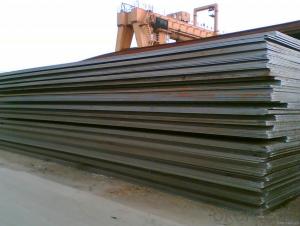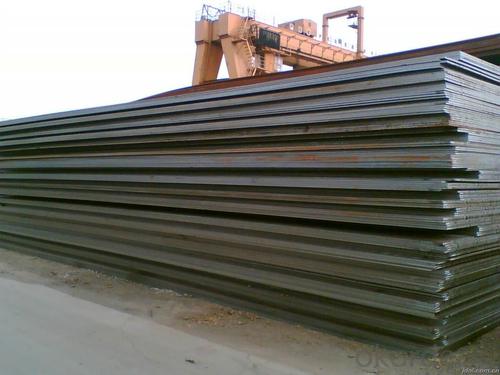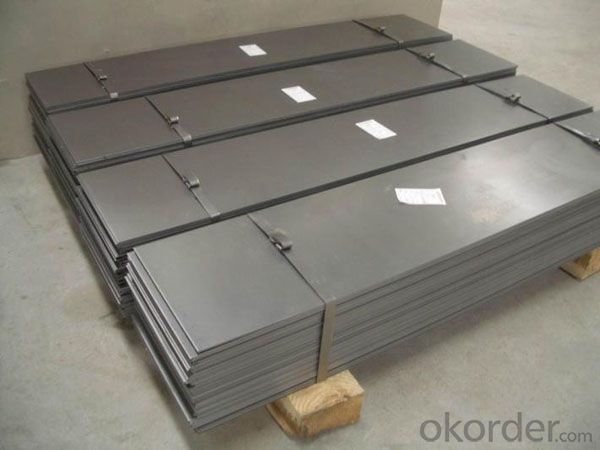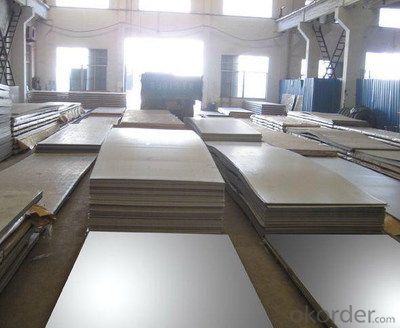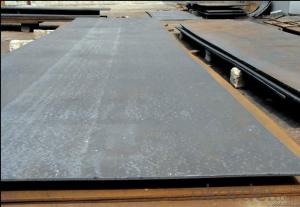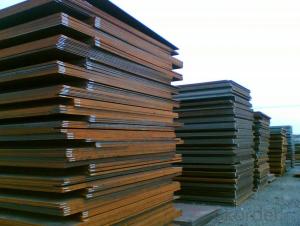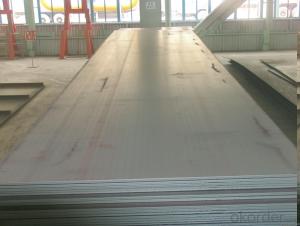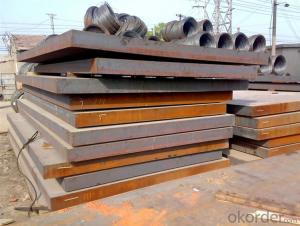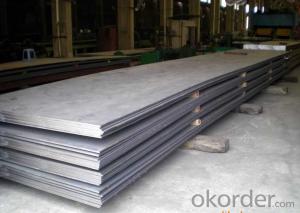Special Steel D2/SKD11 High Carbon Steel Plate
- Loading Port:
- China main port
- Payment Terms:
- TT OR LC
- Min Order Qty:
- 25 m.t.
- Supply Capability:
- 10000 m.t./month
OKorder Service Pledge
OKorder Financial Service
You Might Also Like
Specification
Chemical Composition(%)
| Country | Standard | C | Si | Mn | Cr | Mo | V | S | P | Other |
| China(GB) | Cr12Mo1V1 | 1.40-1.60 | ≤0.60 | ≤0.60 | 11.0-13.0 | 0.70-1.20 | ≤1.10 | ≤0.030 | ≤0.030 | Co≤1.00 |
| USA(ASTM) | D2 | 1.40-1.60 | 0.30-0.50 | 0.30-0.50 | 11.0-13.0 | 0.70-1.20 | 0.8 | ≤0.025 | ≤0.025 | Co:0.60 |
| Germany(DIN) | 1.2379 | 1.50-1.60 | 0.10-0.40 | 0.15-0.45 | 11.5-12.5 | 0.60-0.80 | 0.90-1.10 | ≤0.030 | ≤0.030 | - |
| Japan(JIS) | SKD11 | 1.40-1.60 | ≤0.40 | ≤0.60 | 11.0-13.0 | 0.80-1.20 | 0.20-0.50 | - | - | Ni≤0.50 |
Available Size
| Rolled flat steel | 12-90mm×205-610mm×L |
| Forged flat steel | 100-300mm×400-600mm×L |
Characterstics
| 1.High hardening ability and quench-hardening performance | ||||||
| 2.High abrasive resistance | ||||||
| 3.Good oxidation resistance at elevated temperatures | ||||||
| 4.Less deformation after heat treatment |
Applications: suitable for various complicated cold working dies with high precision and long lifetime,such as punching dies,cold extrusion dies,thread rolling dies,screw plates,cold extrusion dies,and precise measuring devices


1, Your advantages?
professional products inquiry, products knowledge train (for agents), smooth goods delivery, excellent customer solution proposale
2, Test & Certificate?
SGS test is available, customer inspection before shipping is welcome, third party inspection is no problem
3, Payment Terms?
30% TT as deposit and 70% before delivery.
Irrevocable L/C at sight.
4, Trading Terms?
EXW, FOB, CIF, FFR, CNF
6, After-sale Service?
We provides the services and support you need for every step of our cooperation. We're the business partner you can trust.
For any problem, please kindly contact us at any your convenient time.
We'll reply you in our first priority within 24 hours.
- Q: How is special steel made?
- Special steel is made through a process called alloying, where different elements are added to iron to enhance its properties such as strength, durability, and resistance to corrosion. This alloying process can include elements like chromium, nickel, vanadium, and manganese, among others. The exact composition and manufacturing process can vary depending on the desired characteristics and application of the special steel being produced.
- Q: What is the composition of special steel?
- Special steel's composition may vary depending on its intended use and the specific properties needed. Generally, it is an alloy of iron and carbon, with additional elements incorporated to enhance its strength, toughness, corrosion resistance, and other desired characteristics. Commonly found alloying elements in special steel compositions include chromium, nickel, manganese, molybdenum, vanadium, tungsten, and cobalt. These elements are meticulously chosen and added in precise quantities to attain the desired mechanical, physical, and chemical properties of the steel. The composition of special steel can be customized to meet industry-specific requirements, such as those in aerospace, automotive, oil and gas, or construction.
- Q: What are the different methods of machining special steel?
- There are several different methods of machining special steel, each with its own advantages and applications. Some of the most common methods include: 1. Turning: Turning is a machining process that involves rotating a workpiece while a cutting tool removes material from the surface. This method is typically used to create cylindrical shapes and can produce high-quality finishes. 2. Milling: Milling is a versatile machining method that uses rotary cutters to remove material from a workpiece. It can be used to create complex shapes and contours, and is often employed in the production of special steel components. 3. Drilling: Drilling is a machining process that involves creating holes in a workpiece using a rotating cutting tool. It can be used to create both through holes and blind holes in special steel, and is commonly used in various industries. 4. Grinding: Grinding is a precision machining method that uses an abrasive wheel to remove material from a workpiece's surface. It is often used to achieve tight tolerances and smooth finishes on special steel components. 5. Broaching: Broaching is a machining process that uses a sharp cutting tool with multiple teeth to remove material in a series of linear cuts. It is commonly used to create keyways, splines, and other intricate shapes in special steel. 6. Electrical Discharge Machining (EDM): EDM is a non-traditional machining method that uses electrical discharges to remove material from a workpiece. It is particularly useful for machining special steel with complex shapes or for creating small features. 7. Laser Cutting: Laser cutting utilizes a high-powered laser to cut through special steel with extreme precision. It is commonly used for intricate designs and can produce smooth edges without the need for subsequent processing. Each of these methods has its own advantages and limitations, and the choice of machining method depends on factors such as the desired outcome, the complexity of the part, and the properties of the special steel being machined.
- Q: What are the characteristics of high-speed steel?
- High-speed steel (HSS) is known for its exceptional durability and heat resistance. It has excellent hardness, toughness, and wear resistance, making it suitable for cutting tools and machining applications. HSS can withstand high temperatures without losing its hardness, allowing it to cut at high speeds without losing its sharpness. Additionally, it has good dimensional stability and can maintain its shape even under extreme conditions.
- Q: What are the different corrosion-resistant coatings for special steel?
- There are several corrosion-resistant coatings available for special steel, including zinc coatings, aluminum coatings, stainless steel coatings, and ceramic coatings. These coatings provide a protective barrier that prevents the steel from coming into contact with corrosive elements, thus extending its lifespan and maintaining its structural integrity.
- Q: How does special steel contribute to the power transmission sector?
- The power transmission sector relies heavily on special steel due to its exceptional properties and performance characteristics. Special steel is highly valued for its strength and resilience, making it an ideal material for manufacturing various components of power transmission systems. For example, transmission towers require special steel for their stability and durability, even in extreme weather conditions. Additionally, special steel's resistance to corrosion is particularly advantageous in the power transmission sector. Power transmission equipment often faces harsh environments, such as high humidity, chemical pollutants, and saltwater exposure, which can speed up corrosion. By using special steel in the manufacturing process, the risk of corrosion-related failures is significantly reduced, ensuring a reliable and uninterrupted power transmission. Furthermore, special steel's excellent electrical conductivity makes it a perfect choice for conductors and cables used in power transmission. Efficient transfer of electrical energy is crucial to minimize power losses and optimize the transmission process. Special steel conductors offer low resistance to the flow of electricity, enabling efficient power transmission over long distances. Moreover, special steel is also employed in the production of transformers and other electrical equipment used in power transmission. The magnetic properties of special steel make it an excellent material for transformer cores, facilitating efficient energy conversion and minimizing energy losses during transmission. In summary, special steel greatly contributes to the power transmission sector by providing strength, corrosion resistance, electrical conductivity, and magnetic properties. These properties ensure the reliability, efficiency, and longevity of power transmission systems, ultimately supporting the uninterrupted supply of electricity to industries, businesses, and households.
- Q: What are the cost considerations when using special steel?
- When utilizing special steel, there are several factors to consider in terms of cost. To begin with, the cost of the raw materials required for the production of special steel can be significantly higher compared to regular steel. Special steel often incorporates alloying elements like chromium, nickel, or molybdenum, which tend to be more costly than the iron and carbon used in regular steel production. These alloying elements enhance the properties of the steel, resulting in increased strength, greater resistance to corrosion, or improved suitability for specific applications. Furthermore, the production process for special steel may entail additional steps or specialized equipment, leading to higher manufacturing costs. This can involve procedures like vacuum degassing, controlled cooling, or precision forging, all of which contribute to the quality and performance of the final product but also add to the overall expenses. Moreover, since special steel is often customized to meet specific requirements or industry standards, there may be additional costs associated with testing and certification. These can include non-destructive testing, material analysis, or third-party inspections to ensure compliance with the necessary specifications. These additional quality control measures can raise the overall cost of utilizing special steel. Lastly, the cost of special steel can also be influenced by its demand and availability. If there is high demand for certain types of special steel or if the supply is limited, prices may be driven up. This can be particularly pertinent to industries that rely on specialized steel grades such as aerospace, automotive, or oil and gas. In conclusion, the cost considerations when using special steel encompass the higher cost of raw materials, the additional manufacturing steps, the requirements for testing and certification, and the overall dynamics of supply and demand in the market. However, it is important to note that the benefits and advantages of employing special steel, such as improved performance, durability, or specific properties, often outweigh the higher costs, making it a worthwhile investment for many industries.
- Q: How does special steel contribute to the automotive suspension industry?
- Special steel plays a crucial role in the automotive suspension industry by providing enhanced strength, durability, and performance to suspension components. Special steel alloys, such as high-strength low-alloy (HSLA) steel, are specifically designed to withstand the rigorous demands of the suspension system, ensuring optimal performance and safety. One of the key benefits of special steel in the automotive suspension industry is its exceptional strength-to-weight ratio. Suspension components made from special steel alloys are able to withstand heavy loads and resist deformation, leading to improved handling, stability, and overall vehicle performance. This strength also contributes to increased durability, reducing the likelihood of premature component failure and extending the lifespan of the suspension system. Moreover, special steel offers superior fatigue resistance, which is crucial in the suspension industry where components are subjected to repetitive stress and vibrations. This fatigue resistance helps to prevent cracks and fractures in suspension parts, ensuring reliable and safe operation even under challenging conditions. In addition, special steel alloys can provide enhanced corrosion resistance, protecting suspension components from the detrimental effects of moisture, salt, and other environmental factors. This corrosion resistance helps to prolong the lifespan of the suspension system, reducing maintenance costs and improving overall reliability. Furthermore, special steel allows for improved design flexibility in suspension components. Its unique properties, such as high formability and weldability, enable manufacturers to produce complex and lightweight designs, resulting in more efficient suspension systems. These lightweight designs not only contribute to fuel efficiency and reduced emissions but also enhance the overall driving experience by improving vehicle agility and responsiveness. In summary, special steel is vital to the automotive suspension industry as it provides enhanced strength, durability, and performance to suspension components. Its exceptional strength-to-weight ratio, fatigue resistance, corrosion resistance, and design flexibility contribute to improved handling, stability, safety, and overall vehicle performance. Through its unique properties, special steel helps to ensure reliable and efficient suspension systems, meeting the demanding requirements of the automotive industry.
- Q: Can special steel be used in the medical field?
- Yes, special steel can be used in the medical field. Special steel alloys, such as stainless steel, are widely used in medical and surgical instruments, implants, and equipment. Stainless steel is chosen for its excellent corrosion resistance, strength, and durability. It is often used for surgical instruments like scalpels, forceps, and needles, as well as for orthopedic implants like bone screws and plates. Additionally, special steel alloys are used in the construction of medical equipment like MRI machines and X-ray tables, where high strength and magnetic properties are required. Overall, special steel is an essential material in the medical field due to its unique properties and ability to meet the stringent requirements for hygiene, safety, and reliability.
- Q: How does special steel contribute to the agriculture aftermarket industry?
- Special steel plays a crucial role in the agriculture aftermarket industry by providing high-performance components and equipment that enhance productivity and efficiency in farming operations. Special steel, also known as alloy steel, is engineered to have specific properties such as strength, durability, corrosion resistance, and heat resistance, making it ideal for various agricultural applications. One of the key contributions of special steel to the agriculture aftermarket industry is the production of durable and reliable machinery parts. These parts, such as plowshares, blades, and tines, are subjected to harsh conditions, including intense wear, impact, and exposure to corrosive substances. Special steel components can withstand these challenges and offer extended service life, reducing downtime and maintenance costs for farmers. Furthermore, special steel is used in the manufacturing of agricultural equipment like tractors, harvesters, and sprayers. These machines require robust and lightweight materials to ensure optimal performance and fuel efficiency. Special steel grades provide the necessary strength while keeping the weight of the equipment low, allowing farmers to cover larger areas and increase productivity. Additionally, special steel alloys are used in the production of precision tools, such as cutting blades and drill bits, used in precision farming techniques. These tools enable farmers to perform tasks with high accuracy, such as soil sampling, seeding, and crop monitoring. The durability and sharpness of special steel tools enhance the precision and effectiveness of these operations, leading to improved crop yields and resource utilization. Moreover, special steel is also employed in the construction of infrastructure related to the agriculture aftermarket industry. For example, steel beams and columns are used in the fabrication of storage facilities, barns, and grain silos, providing structural strength and stability. This infrastructure allows for efficient storage, handling, and transportation of agricultural products, contributing to the overall efficiency of the industry. In conclusion, special steel is an essential component in the agriculture aftermarket industry as it contributes to the production of durable machinery parts, lightweight equipment, precision tools, and robust infrastructure. By offering enhanced strength, durability, and corrosion resistance, special steel helps farmers improve productivity, reduce downtime and maintenance costs, and achieve better crop yields.
Send your message to us
Special Steel D2/SKD11 High Carbon Steel Plate
- Loading Port:
- China main port
- Payment Terms:
- TT OR LC
- Min Order Qty:
- 25 m.t.
- Supply Capability:
- 10000 m.t./month
OKorder Service Pledge
OKorder Financial Service
Similar products
Hot products
Hot Searches
Related keywords
